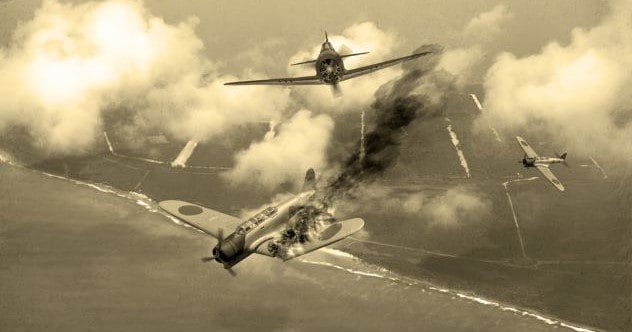We often hear that success comes from careful planning and hard work. While this is true in many areas of life, history shows us that sometimes, luck plays a significant role, especially in warfare. Military leaders plan and prepare meticulously, but unforeseen events can change everything. A sudden storm, a misplaced document, or a simple coincidence can dramatically alter the course of a battle.
Skill and strategy are vital, but there are moments where luck, fate, or nature’s intervention can turn the tide. This list explores ten historical battles where luck was a deciding factor, shifting the advantage and changing history. These examples remind us that in the chaos of war, the unexpected can often determine the outcome.
A Storm Saved Washington, D.C., from a British Assault
In 1814, the British attacked Washington, D.C., during the War of 1812, setting fire to important buildings like the White House and the Capitol. It seemed certain that the city would be destroyed. However, nature had other ideas. A powerful storm, possibly a hurricane, swept through the city, putting out the fires and scattering the British troops. The storm was so intense that it uprooted trees and forced the British to seek shelter. By the time the storm passed, the British had lost their momentum and didn’t resume their attack. This unexpected weather saved the capital and became a symbol of American resilience. [1]
The Five Minutes That Changed the Battle of Midway
The Battle of Midway in 1942 was a crucial turning point in World War II. After the attack on Pearl Harbor, Japan aimed to cripple the American Pacific Fleet. The Japanese launched a large-scale assault on Midway Atoll, hoping to trap U.S. carriers. However, as American planes attacked the Japanese fleet with little success, luck intervened. In a five-minute window, American dive bombers arrived just as the Japanese were rearming and refueling their planes. The Japanese carriers, full of bombs and fuel, were vulnerable. In those minutes, three of Japan’s major aircraft carriers were destroyed. This stroke of luck shifted the naval power in the Pacific and marked the beginning of Japan’s decline in World War II. [2]
Fog Saves Washington’s Troops at the Battle of Brooklyn
In the summer of 1776, George Washington’s Continental Army faced the British Empire in New York. After a defeat at the Battle of Brooklyn, Washington’s troops were trapped on Brooklyn Heights, with the East River behind them and British forces closing in. Their only hope was a risky nighttime evacuation. As the British prepared for a final assault, a thick fog rolled in before dawn, hiding Washington’s troops. Under the fog, the Continental Army quietly evacuated nearly 9,000 soldiers across the river to safety. By the time the fog lifted, the British were surprised to find the American positions empty. This escape, aided by the fog, allowed the Revolutionary War to continue, eventually leading to American independence. [3]
An Unplanned Bridge Capture at Remagen
In the final months of World War II, the capture of the Ludendorff Bridge at Remagen was a turning point. The bridge, crossing the Rhine River, was crucial, and the Germans planned to destroy it to stop the Allied advance. However, a series of fortunate events led to its capture. American forces advanced faster than expected and reached the bridge before the Germans could destroy it. The explosives planted by the Germans failed to detonate fully, leaving the bridge intact. This allowed American troops to cross the bridge and establish a foothold on the eastern bank of the Rhine. The capture of the Ludendorff Bridge sped up the Allied invasion of Germany and contributed to the defeat of the Third Reich. [4]
A Storm Saves England from the Spanish Armada
In 1588, the Spanish Empire launched the Spanish Armada to invade England. The Armada, with 130 ships and thousands of soldiers, aimed to overthrow Queen Elizabeth I and restore Catholicism. However, as the Armada sailed through the English Channel, it encountered a severe storm. The storm scattered the Spanish ships, causing damage and disarray. The English navy attacked, inflicting further damage on the Armada. As the Spanish fleet retreated, another storm struck, sinking many ships. Only a few ships returned to Spain, marking the end of Spain’s dominance and the rise of England as a naval power. This loss for Spain was due to the unpredictable nature of the sea. [5]
Hemorrhoids and Rain Doom Napoleon at Waterloo
Napoleon Bonaparte, one of history’s greatest military leaders, faced defeat at the Battle of Waterloo in 1815, partly due to bad luck. On the morning of the battle, Napoleon suffered from severe hemorrhoids, preventing him from riding his horse and surveying the battlefield. This limited his command abilities. Additionally, a heavy rainstorm had soaked the battlefield, turning it into mud. Napoleon, who relied on artillery, had to delay his attack until the ground dried, giving the British and their allies time to regroup. When the battle started, the French forces struggled to maneuver in the mud, making their attacks less effective. The combination of Napoleon’s health and the rain contributed to his defeat, ending his reign and changing European history. [6]
Mud Stops the French at the Battle of Agincourt
The Battle of Agincourt in 1415 is a celebrated English victory, shaped by weather. The English army, led by King Henry V, was outnumbered by the French, who expected an easy win. However, heavy rains turned the battlefield into mud. The French knights, in heavy armor, struggled to move across the slippery ground. As they charged, their horses became stuck in the mud, and many knights were thrown off balance. The English longbowmen, on higher ground, unleashed arrows on the struggling French troops. The mud slowed the French and created chaos, turning a likely victory into a defeat. The Battle of Agincourt showed how nature can undo even the strongest army. [7]
The Lost Confederate Battle Plan at Antietam
The Battle of Antietam in 1862 was the bloodiest single day in American history, influenced by a stroke of luck. Confederate General Robert E. Lee’s battle plans were lost and found by Union soldiers. A soldier discovered the plans wrapped around cigars in a field in Maryland. Union General George McClellan realized he had an opportunity to strike Lee’s divided forces. With this information, McClellan moved to intercept the Confederates at Antietam Creek. The battle was brutal, with no clear winner, but Lee’s invasion was halted, and he retreated South. The Union’s discovery of the lost plans prevented a Confederate victory and allowed President Abraham Lincoln to issue the Emancipation Proclamation. [8]
A Luftwaffe Mistake Turns the Tide of the Battle of Britain
The Battle of Britain in 1940 was a turning point in World War II, influenced by a mistake by the German Luftwaffe. The Germans aimed to cripple the Royal Air Force (RAF) by targeting airfields, preparing for an invasion of Britain. However, a German bomber accidentally dropped its bombs on London, a civilian target. The British retaliated by bombing Berlin. Hitler ordered the Luftwaffe to shift its focus from RAF airfields to bombing British cities in the Blitz. This allowed the RAF to recover and rebuild its fighter strength. Britain resisted the German air assault, preventing the invasion. If not for that accidental bombing, Germany might have achieved air superiority, changing the course of the war. [9]
Typhoons Save Japan from Mongol Invasions Twice
The Mongol Empire, under Kublai Khan, was a powerful military force. In the late 13th century, they aimed to conquer Japan, launching two invasion attempts. The first invasion in 1274 met resistance from Japanese samurai, but a typhoon, known as the “divine wind” or kamikaze, devastated the Mongol fleet, destroying one-third of their ships and forcing them to retreat. Undeterred, Kublai Khan launched a second invasion in 1281 with a larger force. History repeated itself as another typhoon struck, wiping out two-thirds of the Mongol force. These typhoons saved Japan from Mongol domination, and the Mongol Empire never attempted another invasion. This event preserved Japan’s independence and became a defining moment in Japanese history. [10]
These battles demonstrate that while strategy and preparation are key, luck can play a decisive role in warfare. From storms and fog to lost documents and simple mistakes, these moments of chance have altered the course of history, reminding us that the unexpected can often determine the outcome.
What do you think about the role of luck in these battles? Leave your comment below.










